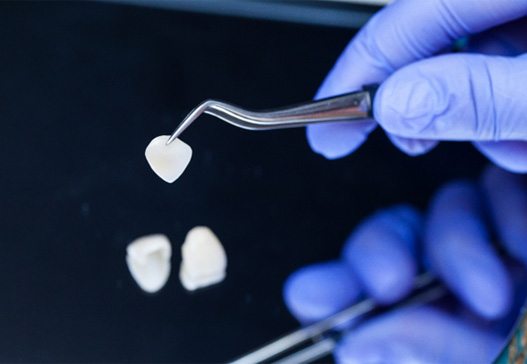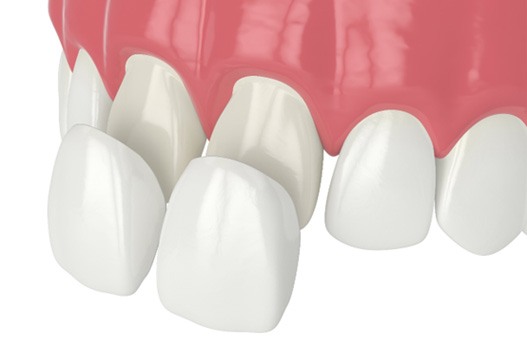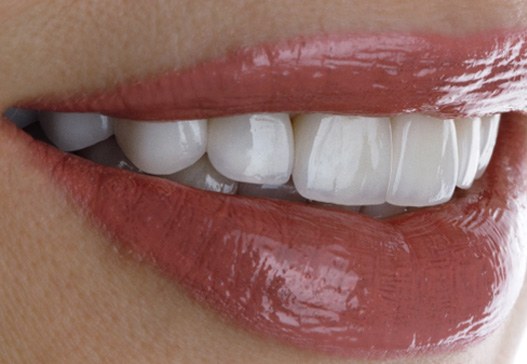Veneers – Warsaw, IN
Transform Your Teeth with Veneers

In some cases, your smile might suffer from more than one flaw. Perhaps it’s both discolored and chipped, as well as misaligned. However, you don’t need multiple treatments to fix these problems — just get veneers in Warsaw! Dr. Rudolph at East Center Dental can use them to transform your smile in only two visits. To learn how that’s possible, keep reading or call our office to book an initial visit .
What are Dental Veneers?

Dental veneers are thin, ceramic shells that dentists place on the fronts of teeth. Their main use is hiding a patient’s tooth flaws — things like stains, chips, cracks, fractures, etc. In fact, they can even close gaps and make teeth seem straighter without the use of braces.
Today, most veneers are made of high-quality porcelain — a material that can easily match a patient’s tooth enamel. Since dentists can customize its color, size, and shape, it easily blends with the rest of your smile. As a bonus, the porcelain makes veneers durable and stain-resistant too.
Given the shells’ traits, then, it’s unsurprising that they’re popular among patients.
The Process of Getting Veneers

In general, veneer placement takes about two visits. For the first one, you’ll consult with Dr. Rudolph and prepare your teeth for treatment. Later, you’ll attend a follow-up where we place the veneers over your pearly whites.
The initial appointment is what we call the “preparatory visit.” It’ll start with you and Dr. Rudolph discussing your treatment goals, the smile flaws you want to correct, etc. Once this task is done, he’ll prep your teeth for veneers by cleaning them and removing some of their enamel. Lastly, we’ll take a dental impression that a lab uses to make your prosthetics. Since this latter process takes a few weeks, you’ll wear temporary veneers in the meantime.
The second visit, also known as the “final placement,” takes place when your permanent veneers are ready. As you might expect, it’ll mainly consist of Dr. Rudolph fitting the porcelain layers onto your teeth. He’ll also make some adjustments to ensure the veneers work correctly.
The Benefits of Veneers

You’ll experience various perks from a veneer treatment. They include things like:
- High Protectiveness: Porcelain is highly stain-resistant, so veneers don’t discolor as easily as natural tooth enamel. As such, they can better endure staining agents in drinks like coffee, red wine, and soda.
- Versatility: Due to being customizable, veneers can hide a wide variety of smile flaws at once.
- Lifelike Results: The porcelain in veneers is naturally white and beautiful. That being the case, the layers are very lifelike and blend seamlessly with surrounding teeth.
- Long-Lasting Effects: On average, veneers last for about 15 years or so. With proper care, though, their lifespan reaches 30 years or more!
Veneers FAQs
How Long Do Veneers Last?
On average, veneers last about 10 to 15 years. Their lifespan can reach even higher, though, in some cases.
That said, keep in mind that the shells only last long if given proper care. Otherwise, they can fail early due to fractures, chips, and other damage. You should thus remember to do the following:
- Practice Good Oral Hygiene – While veneers are artificial, brush them twice daily and floss between them once daily. That way, you’ll keep the underlying teeth from decaying.
- Avoid Bad Oral Habits – Biting on hard objects like fingernails or ice cubes could damage your prosthetics. Likewise, smoking tobacco products will likely discolor them.
Is There Anything I Can’t Eat with Veneers?
Food restrictions will differ based on which type of veneers you have: temporary models or permanent ones.
You’ll need to be extra careful when wearing temporary veneers while the later ones are made. Hard items like ice, raw fruits, veggies, and candy could break the restoration. These veneers stain pretty easily, too, so be wary of darkly-pigmented foods and drinks.
Permanent veneers let you enjoy most foods, but you should still pay attention to your meals. Extremely hard or crunchy foods could cause damage, while dark beverages may result in stains. Another risk is alcohol, which can weaken the cement that holds your veneers in place.
Can You Whiten Veneers?
Unfortunately, whitening won’t work on veneers. If you need them to be much brighter, your only option is to replace or shade them.
You see, whiteners are only effective on natural teeth. Their gel can seep into the enamel’s pores and remove its stains. In contrast, the porcelain in veneers has no pores for the gel to enter.
If you plan to have whitening and veneers done, it’s best to start with the former procedure first. That way, the porcelain shells can be color-matched to your teeth later.
Do Veneers Give You a Lisp?
Sometimes, a patient will have a lisp after getting veneers – they’ll struggle to pronounce “s” and “v” sounds. However, this effect is temporary and fades after a few days.
The lisp in question is partially due to muscle memory. When your tongue isn’t used to the thickness veneers add to your teeth, its movements are altered to produce a slight speech impediment. However, it will adjust independently, although practicing pronunciation can make a difference.
If needed, a dentist can reduce your veneers’ thickness to make a lisp disappear too.
I Need a Checkup & Cleaning I Need a Dentist for My Child I am Concerned About Bleeding Gums I Have a Cavity or Broken Tooth I am Missing One or More Teeth I Want to Enhance My Smile I Want a Straighter Smile I am Scared of the Dentist I am in Pain & Need Help I am Concerned About Sleep Apnea View Our Services
